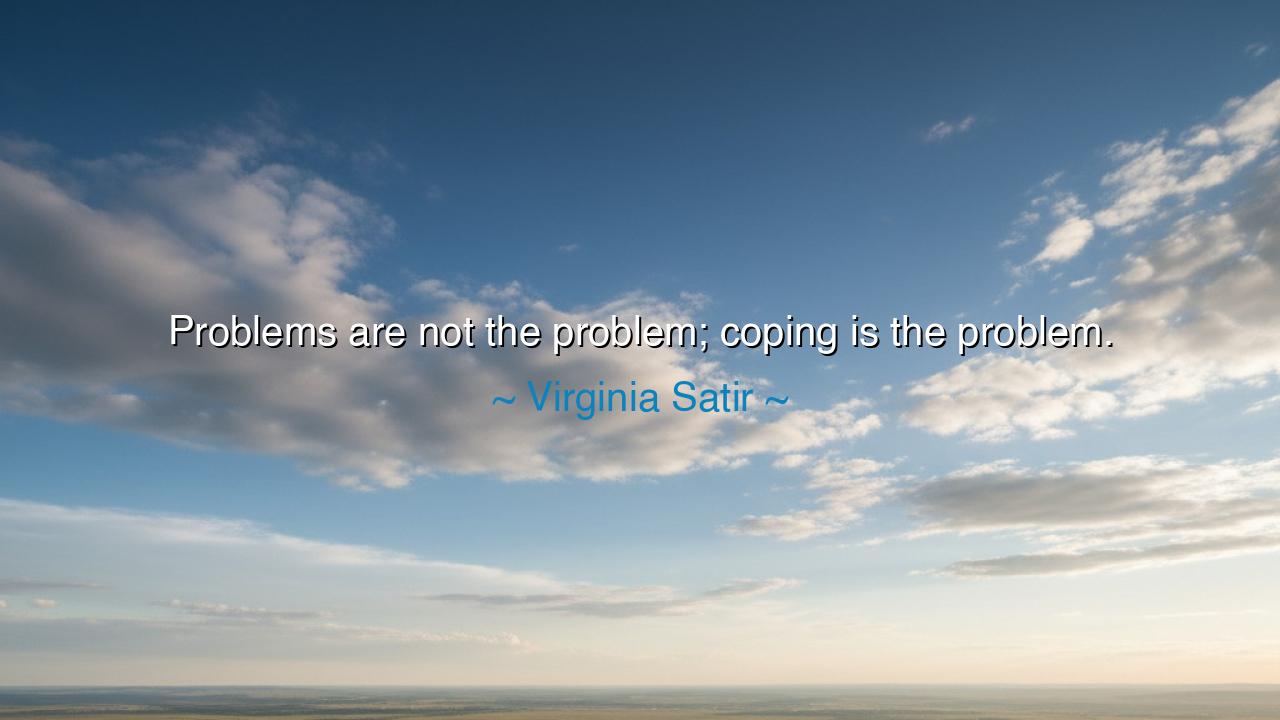
Problems are not the problem; coping is the problem.






Virginia Satir, the great pioneer of family therapy, once declared: “Problems are not the problem; coping is the problem.” In this simple yet piercing truth, she reveals a wisdom as old as human struggle. For it is not the stone in the path that defeats the traveler, but how he chooses to step around it—or stumble against it. Life, by its nature, will always offer problems, as the sea will always offer storms. But the measure of a soul is not found in the storm itself—it is found in the way one sails through it.
The ancients knew this well. The Stoics of Greece and Rome taught that external events cannot destroy us—it is our judgments, our responses, that break or make us. Marcus Aurelius wrote in his Meditations that the obstacle becomes the way, if only we meet it with wisdom. Satir, centuries later, spoke the same eternal law in her own tongue: problems are inevitable, but coping determines whether we rise or fall.
Consider the story of Abraham Lincoln. He faced endless problems—failures in business, defeats in politics, and the death of children he dearly loved. Most crushing of all was the burden of leading a fractured nation through civil war. The problems he faced were monumental. Yet what preserved him was not the absence of hardship, but his manner of coping. He met despair with perseverance, opposition with patience, and failure with resilience. Had he surrendered to discouragement, history would have named him forgotten. But by coping with strength, he became one of the most revered leaders in memory.
So it is with every life. The problems may change—loss, betrayal, poverty, illness—but the essence remains. Some, when faced with these, turn bitter, collapse, or flee. Others, faced with the same storms, grow deeper in compassion, stronger in character, clearer in purpose. The difference lies not in the problem, but in the coping. The same fire that burns the weak tempers the strong into steel.
The meaning of Satir’s words is both sobering and liberating: we cannot control the arrival of problems, but we can master the art of coping. To blame the problem is to waste energy; to strengthen our coping is to gain freedom. Thus the true battlefield is within. The outer challenge is but a mirror reflecting the inner state. If the mind is weak, even small problems feel unbearable. If the spirit is strong, even great mountains can be moved.
The lesson is clear: train the heart to cope, and no problem shall destroy you. This training begins with self-awareness, honesty, and courage. When hardship strikes, do not ask, “Why me?” but rather, “How shall I respond?” Seek wisdom in stillness, seek support in fellowship, and seek resilience through small acts of courage each day. These are the weapons of coping. Without them, life’s problems will devour you. With them, you will discover the hidden strength of your spirit.
Therefore, let each person practice this path. Build habits of calmness when anger calls, of patience when fear presses, of hope when despair whispers. Strengthen your body, sharpen your mind, and nurture your soul, for these are the roots of effective coping. Surround yourself with companions who lift you, not those who magnify the problem. And remember always: your freedom lies not in the absence of hardship, but in your response to it.
Thus Virginia Satir’s words endure as a timeless teaching: “Problems are not the problem; coping is the problem.” Hear them well, and you will find that every hardship becomes an invitation, every sorrow a teacher, every obstacle a forge. And those who learn to cope wisely shall discover that no problem can break them—for they have already claimed the greater victory, the mastery of the self.






AAdministratorAdministrator
Welcome, honored guests. Please leave a comment, we will respond soon